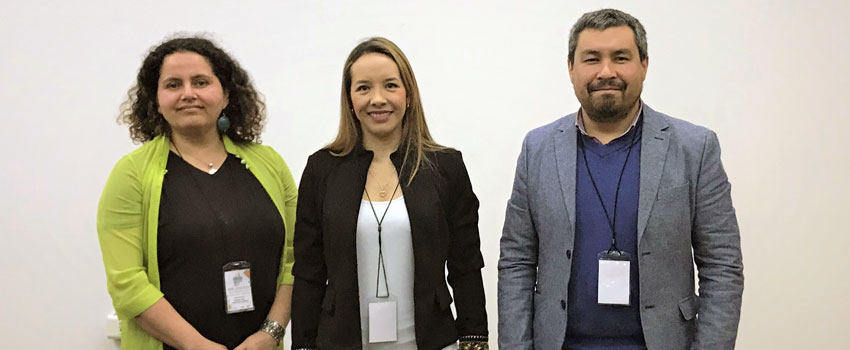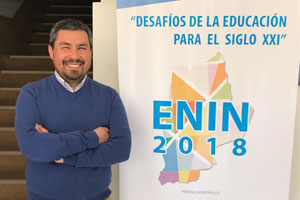- News
Researcher talks about the adaptation of an instrument that measures 'pedagogical technological and content knowledge' in teachers

The work was presented at the XXIV National Meeting of Educational Researchers (ENIN) 2018, which had the support of the Ministry of Education and the sponsorship of CONFAUCE, and took place between August 29 and 31 at the University of Antofagasta.
Constituted as a space that allows sharing work in the field of education, the XXI ENIN Meeting brought together different actors from the school system, who in this version reflected on the “Challenges of Education in the XNUMXst Century.” On the occasion, the thematic axes were related to Educational Inclusion, Innovation in Research in Education and Pedagogy, Neurosciences, Teacher Professional Development, and Educational Policy and Management.
In this context, Dr. Hugo Tapia, researcher at the Integrated Management of Pedagogies Unit (UGIP) of the University of La Serena, participated in the Innovation in Education round table: ICT for education, with the presentation “Adaptation of an instrument for measuring TPACK (Technology, Pedagogy And Content Knowledge) in in-service teachers in Chile”, which presented the bases of the questionnaire and its respective validation.
 “As part of the DIDULS PR 17511 project 'Characterization of Pedagogical Technological and Content Knowledge in Teachers of the Province of Elqui', the adaptation to the local context of the Schmidt et al. questionnaire was carried out to measure Pedagogical Technological and Content Knowledge. practicing teachers in the Chilean educational system. That is, we took the proposal of Schmidt and his team, which was focused on measuring this type of knowledge in teachers in training, and we adapted it to use it with Chilean teachers who are working in schools. This involved adapting the contents of the questionnaire as well as the language used to refer, for example, to the curricular bases,” explained the researcher.
“As part of the DIDULS PR 17511 project 'Characterization of Pedagogical Technological and Content Knowledge in Teachers of the Province of Elqui', the adaptation to the local context of the Schmidt et al. questionnaire was carried out to measure Pedagogical Technological and Content Knowledge. practicing teachers in the Chilean educational system. That is, we took the proposal of Schmidt and his team, which was focused on measuring this type of knowledge in teachers in training, and we adapted it to use it with Chilean teachers who are working in schools. This involved adapting the contents of the questionnaire as well as the language used to refer, for example, to the curricular bases,” explained the researcher.
Challenges of XNUMXst century Education
Regarding the central theme of the meeting, Dr. Tapia stated that “XNUMXst century education faces challenges that, in one way or another, it has had to consider before: helping to humanize human beings. Without delving into this expression, I believe that the school system is in a context in which the recognition and respect of identity, as a condition for the construction of a freer and more equitable society, emerges as a permanent requirement. In this regard, every process carried out and every result sought must focus on each person being able to fully develop their identity with others. Because, and here a second challenge is present, it is not just an isolated identity, but it must be carried out in an educational context that encourages it to occur for one's own well-being and that of the nearby and global community.
Furthermore, he added that a third challenge arises related to “redefining learning and how to achieve it in the educational process, building learning environments more open to change, that take advantage of the opportunities that technologies give us, for example, to redefine and humanize them; permanently evaluate the knowledge to be addressed and update it; Listening to students, giving them a more leading role in the various stages of their training, among others, are aspects that must be considered," said the researcher.
In this way, the conferences held in three days allowed the participants from the different national universities to carry out an academic reflection on the projection of education in the current century.
“The meeting was an important space to learn about the experiences of other institutions and researchers on issues such as teacher training, research on teaching and learning strategies, public policies, among others. But it not only becomes a space to learn what others are researching, but also to get to know the researcher as a subject with important professional experience. Knowing what researchers do in other institutions, their concerns, interests and challenges allows us to humanize and contextualize the work that exists behind each paper presented. It is also important to comment that this type of meeting allows the creation of work networks that can be very beneficial for our work,” he concluded.
Source: Unit for the Integrated Management of Pedagogies (UGIP) | PMI FIP ULS1501 – CM ULS 1755
